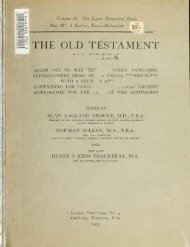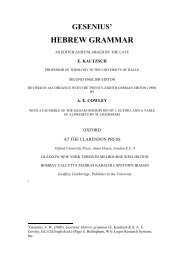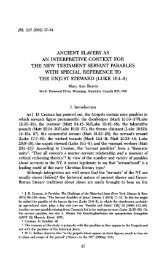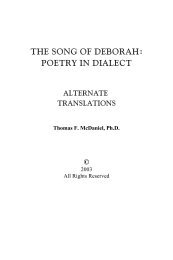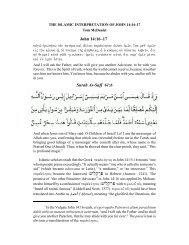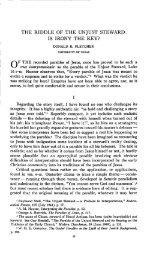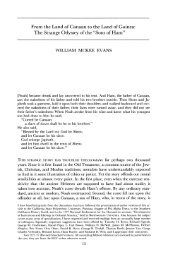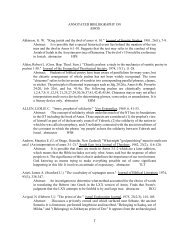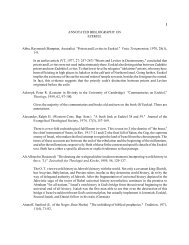annotated bibliography on koran/quran - McDaniel's Web Page
annotated bibliography on koran/quran - McDaniel's Web Page
annotated bibliography on koran/quran - McDaniel's Web Page
Create successful ePaper yourself
Turn your PDF publications into a flip-book with our unique Google optimized e-Paper software.
ANNOTATED BIBLIOGRAPHY ON<br />
KORAN/QURAN<br />
Abdul-Haqq, Akbar (1990) "Christian Reflecti<strong>on</strong>s in the Quran. Evangelical Journal,, 8(2)::74-82.<br />
The birth of Islam was attended by Christian presence and influence, but there was no<br />
Christian witness. Both church leaders and laymen had succumbed to the corrosive<br />
influences of the world, falling prey to jealousies and rivalries under the guide of<br />
theological orthodoxy. The prophet Muhammad must have missed the gospel and Christian<br />
witness to it from a church that was in spiritual depressi<strong>on</strong>. Hence the teaching of the Quran<br />
is a mixture of orthodox with unorthodox teaching regarding the Christian faith - especially<br />
the pers<strong>on</strong> of Jesus Christ. At moments of perplexity, the Prophet and muslims have been<br />
advised by God (in the Quran) to turn to those who read revealed Scriptures before them -<br />
Christians and Jews. The Bible being `the Book of God' (according to Quran) Muslims are<br />
duty bound to believe in it. WSS<br />
al-Faruqi, Ismail (1976) "ON THE NATURE OF THE ISLAMIC DA'WAH. Internati<strong>on</strong>al Review of<br />
Missi<strong>on</strong> 65(260):391 - 409<br />
Da'wah is the fulfillment of the commandment to call all men unto the path of Allah. It is<br />
not coercive nor a psychotropic inducti<strong>on</strong>. It is to all men by the process of rati<strong>on</strong>al<br />
intellecti<strong>on</strong> for a man to return to himself. It is ecumenical because it holds adherents of all<br />
other religi<strong>on</strong>s as equal members of a universal religious brotherhood. Its c<strong>on</strong>tents is the<br />
Quran, in essence that there is no god but God.<br />
Al-Husayni, Ishaq Musa (1960) "CHRIST IN THE QURAN AND IN MODERN ARABIC LITERATURE.<br />
Muslim World 50:297 - 302<br />
-Jesus the s<strong>on</strong> of Mary, as the Quran calls him, is regarded as "from the spirit of God" and<br />
the word of God. Some scholars find a similarity between the idea of revelati<strong>on</strong>, as<br />
c<strong>on</strong>ceived by Muslims, and the character of Christ, the word of God, as c<strong>on</strong>ceived by<br />
Christians. In sum, the Quran recognizes the virgin birth of Christ, and his miracles, places<br />
him <strong>on</strong> a higher rank than all the preceding prophets, states that he was supported by the<br />
Holy Spirit, defends his missi<strong>on</strong> and reproaches those who rejected it, supports the Gospel<br />
as the revelati<strong>on</strong> of God, and c<strong>on</strong>firms his ascensi<strong>on</strong> to God. Five novels c<strong>on</strong>sidered,<br />
written between 1894 and 1958, show this kind of understanding of Christianity by Moslem<br />
writers. The favorable attitude of the Quran toward Christ has determined the attitude of<br />
these novelists, whose love and sympathy for Christ is diffused through all their works.<br />
Antes, Peter (1983) "DIE DARSTELLUNG DES CHRISTENTUMS IN AGYPTISCHEN SCHUL-<br />
BUCHERN VON 1981/82. Zeitschrift fur Missi<strong>on</strong>swissenschaft und Religi<strong>on</strong>swissenschaft 67(1):1 - 18<br />
For a Christian dialogue with Islam it is of great importance to know how the schools<br />
present Christianity to their pupils via textbooks. Egyptian textbooks c<strong>on</strong>cerning Arabic<br />
grammar, social studies, and geography menti<strong>on</strong> Christianity rarely. History textbooks deal<br />
extensively with early Christianity though the death of Christ is not menti<strong>on</strong>ed. Islamic<br />
religious instructi<strong>on</strong> quotes extensively from the Koran and c<strong>on</strong>tains problematic passages,<br />
although the commentary <strong>on</strong> Sura 112 (rejecti<strong>on</strong> of polytheism rather than of the doctrine<br />
of the Trinity) is a hopeful sign. (German)<br />
Ayoub, Mahmoud (1989) "One God and Many Faiths: Islam and the Challenge of Interreligious Dialogue<br />
Drew Gateway 58(3):52-57<br />
Moslems have much in comm<strong>on</strong> with Christians and Jews as m<strong>on</strong>otheists and people of the<br />
Book. Inherent within the Quran is a tolerance for these m<strong>on</strong>otheistic traditi<strong>on</strong>s. Although<br />
Muslim-Jewish- Christian relati<strong>on</strong>s have been marred by c<strong>on</strong>flict, hostility and strife, Islam<br />
envisi<strong>on</strong>ed a world with a plurality of religi<strong>on</strong>s and cultures. Interreligious dialogue can<br />
help us to know and respect each other. Dialogue's primary purpose is to promote peace and<br />
understanding.<br />
Ayoub, Mahmoud Mustafa (1986) "The Word of God in Islam. Greek Orthodox Theological Review<br />
31(1/2):69 - 78
When applied to God, kalima means decree or ordinance, a source of blessing or of<br />
judgment, or revelati<strong>on</strong>. As revelati<strong>on</strong> the eternal Koran was made a book and entered into<br />
our time and history. By analogy, the Trinity in Islam can be seen as the word of command,<br />
of creati<strong>on</strong>, and of revelati<strong>on</strong> and guidance.<br />
Bellamy, James A. (1973) "THE MYSTERIOUS LETTERS OF THE KORAN: OLD ABBREVIATIONS<br />
OF THE BASMALAH. J of the American Oriental Society 93(3):267 - 285<br />
The problem posed by the disc<strong>on</strong>nected letters that appear before 29 surahs of the Koran<br />
has never been solved; though many soluti<strong>on</strong>s have been proposed, n<strong>on</strong>e has found general<br />
acceptance am<strong>on</strong>g scholars. Proposes that all the letters and groups of letters were<br />
originally abbreviati<strong>on</strong>s of the basmalah, some of which became corrupt early in the course<br />
of transmissi<strong>on</strong>. The problem is c<strong>on</strong>ceived of as purely textual in character - not part of the<br />
revelati<strong>on</strong> itself - and is dealt with in the c<strong>on</strong>text of the early textual history of the Koran.<br />
Emendati<strong>on</strong>s of the corrupt abbreviati<strong>on</strong>s are suggested.<br />
Biechler, James E. (1976) "CHRISTIAN HUMANISM CONFRONTS ISLAM: SIFTING THE QURAN<br />
WITH NICHOLAS OF CUSA. J of Ecumenical Studies 13(1):1 - 14<br />
The attitude of Cusanus toward Islam was not representative of his time. C<strong>on</strong>tact with<br />
Muslims during the Council of Basel in C<strong>on</strong>stantinople provided him with direct c<strong>on</strong>tact<br />
with Islam and influenced his more positive approach to Islam and to world religi<strong>on</strong>s<br />
generally. In De pace fidei he c<strong>on</strong>structed a religious dialogue between members of both<br />
faiths, c<strong>on</strong>cluding that faith is essentially <strong>on</strong>e and basic. The corresp<strong>on</strong>dence between<br />
Nicholas and John of Segovia accented the c<strong>on</strong>cept that peaceful negotiati<strong>on</strong> was the most<br />
promising approach toward the Muslims. Cusanus' final work Cribratio Alchor<strong>on</strong> (1461)<br />
was not as positive, but it was not totally negative either. It still approaches the Qur'an as<br />
if it c<strong>on</strong>tained fundamental truths and it dem<strong>on</strong>strates that he still believed doctrinal<br />
accommodati<strong>on</strong> was possible. Ignorance was accountable for the divergences of Islam and<br />
the truth of Christianity lay buried in the Qur'an. The Cribratio is doctrinally reducti<strong>on</strong>istic,<br />
dem<strong>on</strong>strating his impatience with divisive religious dogma - a factor which provides<br />
additi<strong>on</strong>al evidence of his essential humanism.<br />
Bishop, Eric F. (1967) "THE UNRESERVED FRANKNESS OF PRIVILEGE. Bible Translator 18(4):175 -<br />
178<br />
-Examines the Greek parrhesia and its related words. The meaning of the verb is basically<br />
to have freedom in speaking and then to possess an attitude of assurance or daring.<br />
Examines the translati<strong>on</strong> of these words in RSV and NEB al<strong>on</strong>g with various Arabic<br />
versi<strong>on</strong>s and the Koran. The latter translati<strong>on</strong> exhibits a distinctive stand in interpretati<strong>on</strong>.<br />
Bishop, Eric F. (1966) "MEN OF GOD'S GOOD PLEASURE. Anglican Theological Review 48:63 - 69<br />
-The angelic s<strong>on</strong>g about "men of God's good pleasure" can be traced from the Psalter,<br />
through the prophets, in Qumran literature, in the NT, and even in the Quran. It is a<br />
characteristic phrase of the Near East.<br />
Brady, David. (1978) "THE BOOK OF REVELATION AND THE QUR'AN: IS THERE A POSSIBLE<br />
LITERARY RELATIONSHIP? J of Semitic Studies 23(2):216 - 225<br />
There are many similarities between the Apocalypse and the Quran, such as the office of<br />
the authors, the titles and attributes of God, and the image of a banquet for the people of<br />
God, but n<strong>on</strong>e of these seems to demand a hypothesis of literary dependence. Still, the study<br />
of the influence of the apocalyptic genre <strong>on</strong> the Quran would be illuminating.<br />
Carre, Olivier (1984) "JUIFS ET CHRETIENS DANS LA SOCIETE ISLAMIQUE IDEALE D'APRES<br />
SAYYID QUTB. Revue Des Sciences Philosophiques Et Theologiques 68(1):51 - 22<br />
Sayyid Qutb's commentary <strong>on</strong> the Koran (1952 - 65) envisi<strong>on</strong>s tomorrow's ideal Islamic<br />
society as integrating within itself both Jews and Christians, even though both groups have<br />
2
een traditi<strong>on</strong>ally hostile to Islam. Qutb's oppositi<strong>on</strong> to them does not take the form of<br />
hostility to Jewish and Christian minorities. He shows an appreciative understanding of<br />
Christian theology, but not of Jewish. (French)<br />
Christelow, Allan (1985) "The 'Yan Tatsine Disturbances In Kano--A Search For Perspective. Muslim<br />
World 75(2):69 - 84<br />
The 'Yan Tatsine, a Quranic integralist movement, under the leadership of Muhammad<br />
Marwa, known derisively as Mallam Maitatsine, rebelled against the government of Kano,<br />
Nigeria in December, 1980. Maitatsine advocated the strict following of the Quran, the<br />
rejecti<strong>on</strong> of Hadith and Sunna, denying to Muhammad the role of moral exemplar, and<br />
arrogated to himself the role of Prophet. The movement was not a Mahdist movement or<br />
a movement like the Hamaliyya, an offshoot of the Tijaniyya. As a Quranic integralist<br />
movement, the 'Yan Tatsine is likely not dependent up<strong>on</strong> a charismatic figure like<br />
Maitatsine, who was killed, but should be c<strong>on</strong>sidered a type of religious movement which<br />
grows out of the social and ec<strong>on</strong>omic strains of Nigeria in the 1980s.<br />
Clark, Harry (1984) "THE PUBLICATION OF THE KORAN IN LATIN; A REFORMATION DILEMMA.<br />
Sixteenth Century J 15(1):3 - 12<br />
Sixteenth-century scholars and clergy who fought for publicati<strong>on</strong> of the Koran in Latin<br />
were motivated by the desire to refute rather than promote its ideas. In 1536 when Heinrich<br />
Petri wished to print a translati<strong>on</strong> of the Koran, the Basel City Council denied publicati<strong>on</strong><br />
<strong>on</strong> the advice of Wolfgang Capito and Sim<strong>on</strong> Grynaeus. Luther wrote the Council directly,<br />
and together with Bucer tilted the scales in the Council in favor of publicati<strong>on</strong>. There were<br />
three issues of the book in 1543 accompanied by Melanchth<strong>on</strong>'s `Warning to the Reader.'<br />
Cragg, Kenneth (1974) "THE QUR'AN AND THE CONTEMPORARY MIDDLE EAST. J of Ecumenical<br />
Studies 11(1):1 - 12<br />
Does the Quran exert any influence <strong>on</strong> Arab Muslims in their c<strong>on</strong>fr<strong>on</strong>tati<strong>on</strong> with Israel? It<br />
would be false to the Islamic understanding of divine sovereignty in history to expect a<br />
logic of n<strong>on</strong>-violence to develop from Quranic premises. There are possible foundati<strong>on</strong>s for<br />
rec<strong>on</strong>ciliati<strong>on</strong> in the c<strong>on</strong>cepts of itmi'nan (inner peace), Shirk and Tauhid (those idolatries<br />
that break up the unity of all under God), and Istighfar (seeking forgiveness). These<br />
c<strong>on</strong>cepts may be a religious source of hope for peace in the Middle East.<br />
Denny, Frederick Mathews<strong>on</strong> (1975) "THE MEANING OF UMMAH IN THE QUR'AN. History of<br />
Religi<strong>on</strong>s 15(1):34 - 70<br />
C<strong>on</strong>siders the etymology of the term ummah and its meaning in the Quran. Discusses the<br />
usages of the term according to several main themes which reveal Muhammad's developing<br />
c<strong>on</strong>cept of ummah.<br />
Doi, A. R. I. (1970) "A MUSLIM-CHRISTIAN-TRADITIONAL SAINT IN YORUBALAND. Practical<br />
Anthropology 17(6):261 - 268<br />
Muslims in most places practice sucoms combining features of official Islam and features<br />
of traditi<strong>on</strong>al patterns. The worship of Bilikisu Sungbo in Yorubaland shows this. She is<br />
a composite of features from the Biblical account of the Queen of Sheba, the Koran account<br />
of Bilqis (the same historic pers<strong>on</strong>age), and a Yoruba ancestress whose tomb is a shrine for<br />
Muslims, Christians, and pagans alike. This reverence at the tomb may develop into a<br />
regular cult in the future for syncretism seems fairly str<strong>on</strong>g in Yorubaland.<br />
Drane, James F. (1979) "RELIGIOUS TOLERANCE IN AN ISLAMIC REPUBLIC. America 140(9):186 -<br />
187<br />
The character of Islamic scripture (Koran) and traditi<strong>on</strong>s may forewarn some intolerance<br />
ahead in Iran. If there is historical precedent for tolerati<strong>on</strong> of Christians and Jews as people<br />
of the scriptures, the situati<strong>on</strong> for pagan n<strong>on</strong>-believers - modernizing seculars - may be more<br />
3
precarious.<br />
Eminyan, Maurice. (1981) "ISLAM AND CHRISTIANITY: A COMPARATIVE STUDY. Melita<br />
Theologica 32(1/2):6 - 19<br />
Discusses their main tenets, their characteristics and salient features, possible relati<strong>on</strong>ships<br />
and interdependence. Focuses <strong>on</strong>: m<strong>on</strong>otheism, attitude towards Jesus (in the Koran), day<br />
of Judgment, repentance, basis of morality, Pilars of Islam (m<strong>on</strong>otheism, prayers,<br />
almsgiving, fasting and pilgrimage). C<strong>on</strong>cludes by underscoring the basic divergencies and<br />
possibilities in an age of dialogue.<br />
Erder, Yoram (Tel Aviv, Israel) (1990) "The Origin of the Name Idris in the Quran: A Study of the<br />
Influence of Qumran Literature <strong>on</strong> Early Islam. Journal of Near Eastern Studies,, 49(4)::339-350.<br />
C<strong>on</strong>siders two issues: (1) the origin of of Quranic Idris, and (2) the questi<strong>on</strong> of how Islam<br />
came to be influenced by Qumran literature. Argues that the Quranic Idris can be traced to<br />
Doresh ha-Torah, <strong>on</strong>e of the figures menti<strong>on</strong>ed in the Damascus Covenant, as both are<br />
derived from the same root, are identified with Hermes-Mercury, and are related to the<br />
Enoch and hermetic literatures. Without intending to provide a comprehensive answer to<br />
the sec<strong>on</strong>d issue, suggests two possible channels through which Qumran-related Enoch<br />
literature could have entered Islam during its formative period. The first channel is Harrn,<br />
the other is Yemen. HHPD<br />
Fernhout, R. (1982) "WERKELIJK GODS WOORD? Gereformeerd Theologisch Tijdschrift 82(2):70 - 85<br />
Attempts to shed light <strong>on</strong> the current discussi<strong>on</strong> regarding biblical authority by drawing a<br />
phenom<strong>on</strong>ological analysis and comparis<strong>on</strong> between the use of the Bible and the use of the<br />
Koran. Outlines the c<strong>on</strong>tributi<strong>on</strong> of Ahmad ibn Hanbal (780 - 855), the founder of the<br />
extremely c<strong>on</strong>servative Hanbalite School of Sunni Islam and compares it with the<br />
"scholastic" school of orthodoxy. He finds in both literal messages from a transcendent God<br />
and an emphasis <strong>on</strong> rati<strong>on</strong>al evidences. For Christianity to focus <strong>on</strong> either of these would<br />
be to treat the Bible as the Koran rather than as humanly recorded news of God's speaking<br />
and acting. (Dutch)<br />
Fisher, Eugene. (1981) "ANTI-SEMITISM: A CONTEMPORARY CHRISTIAN PERSPECTIVE. Judaism<br />
30(3):276 - 282<br />
Main-line Christianity c<strong>on</strong>demns anti-Semitism as un-Christian and sees itself in<br />
partnership with Jews. But anti-Semitism is a pre-Christian phenomen<strong>on</strong>, some of whose<br />
un-Christian counterparts today are both the Right (KKK, neo-Nazis) with the Center and<br />
Left (PLO). Particularly threatening is Muslim anti-Semitism which has religious roots in<br />
the Koran itself, for the existence of Israel is a theological insult. Soluti<strong>on</strong>: dialogue.<br />
Gispert-Sauch, G. (1968) "MUSLIMS AND CHRISTIANS: REPORT ON A SEMINAR. Clergy M<strong>on</strong>thly<br />
32(8):365 - 370<br />
-The Quran is not <strong>on</strong>ly an expressi<strong>on</strong> of a religious experience but also a book of law.<br />
Communalism is viewed with alarm by Muslims.<br />
Glaser, Ida (1982) "TOWARDS A MUTUAL UNDERSTANDING OF CHRISTIAN AND ISLAMIC<br />
CONCEPTS OF REVELATION. Themelios 7(3):16 - 22<br />
Christianity and Islam have m<strong>on</strong>otheism and a claim to a revealed book in comm<strong>on</strong>. Yet<br />
there is a wide gulf between understandings of revelati<strong>on</strong> in the two faiths and that leads<br />
to inevitable misunderstandings. The Christian does not understand the Quran because he<br />
is not accustomed to the idea of a sacred language. The Quran does not do what a Christian<br />
expects a revelati<strong>on</strong> to do: relate to man's need for forgiveness, salvati<strong>on</strong>, and a relati<strong>on</strong>ship<br />
with God. The Muslim does not understand biblical writings because they are of obviously<br />
human origin and do not give clear guidelines <strong>on</strong> life-style. If Christians and Muslims are<br />
to understand each other, they must recognize and understand the fundamental differences<br />
4
in ways of thinking.<br />
Graham, William A. (1983) "IN MEMORIAM RUDI PARET (1901 - 1983). Muslim World 73(2):133 - 141<br />
Professor Rudi Paret died at his home in Tubingen <strong>on</strong> January 31, 1983. His career spanned<br />
some six decades and several different genre and subject areas in Near Eastern and Islamic<br />
studies. It was in Quranic studies that he made his mark, culminating in his translati<strong>on</strong><br />
(1962) of the Quran and its compani<strong>on</strong> volume, a commentary and c<strong>on</strong>cordance (1971). His<br />
translati<strong>on</strong> gives maximum accuracy of meaning, reproducing the literal original meaning<br />
wherever possible. Alternative renderings are presented in the commentary. Paret was<br />
c<strong>on</strong>vinced that the Quran was the <strong>on</strong>e fully trustworthy document from the time of the<br />
prophet and that Quranic interpretati<strong>on</strong> provided the <strong>on</strong>ly possible basis for any future<br />
renewal of or development of Islamic religious and social thought.<br />
Haddad, Robert M. (1986) "Eastern Orthodoxy and Islam: An Historical Overview. Greek Orthodox<br />
Theological Review 31(1/2):17 - 32<br />
Emperor and caliph were central to Orthodox and Muslim history until the modern age.<br />
Their disappearance has revealed them as hardly crucial to the survival and health of either<br />
religious community. There are parallels in the logos doctrine with Christ and the Koran.<br />
Both faiths widened the scope of reas<strong>on</strong> as a means of clarifying the truths of revelati<strong>on</strong> and<br />
in ordering priorities between reas<strong>on</strong> and revelati<strong>on</strong>, Orthodoxy and Sunni Islam underwent<br />
a comparable evoluti<strong>on</strong> in religious thought and sensibility.<br />
Hajjar, Joseph (1981) "THE BIBLE AND CHRISTIAN WITNESS IN ISLAMIC COUNTRIES.<br />
Internati<strong>on</strong>al Review of Missi<strong>on</strong> 70(279):161 - 173<br />
There are many parallels between the two religi<strong>on</strong>s but there is <strong>on</strong> the <strong>on</strong>e hand a distinctive<br />
prophetic element in the Quran and, <strong>on</strong> the other hand, an inherent doctrinal irreducibility,<br />
and an undeniable spiritual c<strong>on</strong>vergence in piety.<br />
Journet, Charles, (1967) "L'ISLAM Nova et Vetera 42(2):137 - 155<br />
-The supreme treasury of Islam is the supernatural revelati<strong>on</strong> of the <strong>on</strong>e God made to<br />
Abraham. It is impossible to believe that God can be resp<strong>on</strong>sible for the anti-Christian<br />
c<strong>on</strong>tent of the Koran or the idea of a holy war. Yet Mohammed certainly made men better<br />
religiously. (French)<br />
Kairallah, Shereen (1988) "Arabic Studies in Europe with an Accent <strong>on</strong> England Theological Review<br />
9(1):6-26<br />
Surveys the development of Arabic studies in the West through the apologetic and polemic<br />
periods, the biblical epoch (16th and 17th cents.), the decline of Arabic Studies in England<br />
during the sec<strong>on</strong>d half of the 17th and the beginning of the 18th cents. and the modern era<br />
which saw the need to study the Quran in its historical c<strong>on</strong>text and to enquire into the<br />
history of Muhammed. A new image of the East emerged encouraged by the slow breaking<br />
away of oriental studies from the b<strong>on</strong>ds of theology, begun by the popularizers.<br />
Kamsler, Harold M. (Phe<strong>on</strong>ixville,PA) (1990) "Solom<strong>on</strong> and Sheba: Aggadic Roots of the Koran Story. Dor<br />
le Dor,, 18(3)::172-175.<br />
There is evidence of a large Jewish community that existed in sixth and seventh century<br />
Northern Arabia (especially, in Yathrib, later to become Medina). Mohammed was wellversed<br />
in Jewish sources - historical, folklore, legislative, and religious - which are reflected<br />
in the Koran. Parallels Sura 27 of the Koran, which tells the story of King Solom<strong>on</strong> and the<br />
Queen of Sheba, with the l<strong>on</strong>ger Aramaic of Targum Sheni, a midrash to the Book of<br />
Esther. The similarities are striking and <strong>on</strong>e can c<strong>on</strong>clude that the source of Sura 27 is the<br />
Targum Sheni. MC<br />
Keller, Bernard. (1990) "La Jerusalem de David Shahar (The Jerusalem of Davish Shahar) Foi et Vie<br />
5
89(1):39-49<br />
David Shahar, c<strong>on</strong>temporary Hebrew novelist and short story writer, portrays an extreme<br />
diversity of people in Jerusalem: Jews, Arabs, Christians, foreigners. Their diversity is a<br />
manner of speaking of the diversity of those who compose the Jewish identity. They are<br />
captured in their everyday banality. Access to Shahar's universe is via a secti<strong>on</strong> of<br />
Jerusalem, neither the historic Old City nor a modern extensi<strong>on</strong> but between the two,<br />
geographically and metaphorically. Shahar's thought is filled with the Bible, prayers of the<br />
Koran, midrashim, and Kabbala. (French)<br />
Khairallah Shereen (1988) "George Sale and His Circle 1697(?)- 1736 Theological Review 9(2):7-22<br />
Surveys the main c<strong>on</strong>tributi<strong>on</strong> of George Sale and his associates to Arabic Studies in the<br />
18th cent. His chief c<strong>on</strong>tributi<strong>on</strong> was his translati<strong>on</strong> of the Quran into English with the<br />
Preliminary Discourse published in November 1734. Sale's translati<strong>on</strong> was a first attempt<br />
at an academic judgment, unrelated to Christian polemic and was indicative of the trend<br />
towards popularizati<strong>on</strong>.<br />
Knight, G. A. F. (1967) "THE LORD IS ONE. Expository Times 79(1):8 - 10<br />
-The Hebrew terms for "<strong>on</strong>e" are `ehad and yahidh. The latter is used <strong>on</strong>ly in the singular,<br />
but the former can be used in the plural and has a range of meanings. After examining the<br />
uses of `ehad in the OT the author argues that "The Lord is <strong>on</strong>e" does not simply refer to<br />
the singleness of God as is c<strong>on</strong>tended in normative Jewish interpretati<strong>on</strong>, but refers to the<br />
all, comprehensiveness of God. The Jewish insistence that God is a m<strong>on</strong>ad of being is a<br />
post-biblical development similar to that in the Koran. The c<strong>on</strong>cern in the OT is not to<br />
reveal God <strong>on</strong>tologically, but soteriologically.<br />
Lapointe, Roger (1981) "LA SITUATION HERMENEUTIQUE DU CORAN. Studies in Religi<strong>on</strong>/Sciences<br />
Religieuses 10(3):311 - 319<br />
The Koran is the theological and sociological determinant of Islam. One inquires about the<br />
logic which governs its sacrality; <strong>on</strong>e attempts to clarify its hermeneutic situati<strong>on</strong>. Its<br />
hermeneutic is based <strong>on</strong> clear and certain logic, which downplays human desire and<br />
creative imaginati<strong>on</strong>. (French)<br />
Latuihamallo, Peter D. (1984) "WHO IS JESUS IN AN ISLAMIC SOCIETY? THE CASE OF<br />
INDONESIA. Reformed World 38(2):77 - 91<br />
In Ind<strong>on</strong>esia 88.2% of the people are Muslims. 8.84% Christian. Its Ministry of Religious<br />
Affairs includes four Directorate Generals; the state is not religiously neutral, but<br />
guarantees freedom of religi<strong>on</strong> <strong>on</strong> the basis of Pansila, principles calling for the belief in<br />
<strong>on</strong>e supreme divinity, just and civilized humanity, unity of the nati<strong>on</strong>, c<strong>on</strong>census democracy<br />
and social justice. Javanese Islam is not entirely Quranic, since the culture retains Indic<br />
elements. In practice the religi<strong>on</strong> is syncretic, and customary Christian preaching of<br />
Western creedal formula is perceived by Muslims as blasphemy, by mystics as an ingredient<br />
for speculati<strong>on</strong> and c<strong>on</strong>templati<strong>on</strong> and by many Christians themselves as abracadabra. The<br />
efforts of Hamran Amrie, a c<strong>on</strong>vert from Islam, to develop an apologetic out of the Quran<br />
are explained. Unfortunately, it is perceived by Westerners as Nestorian. Sura 5:73 - 77<br />
c<strong>on</strong>demns tri-theism, which orthodox Christianity also opposes. Fresh expressi<strong>on</strong>s of the<br />
faith and a total renewal are needed in the Ind<strong>on</strong>esian church. Part of the `Cairo Lecture'<br />
symposium: "Call to witness to the Gospel today."<br />
Lewis, Jack P. (1984) "Noah and the Flood: In Jewish, Christian, and Muslim Traditi<strong>on</strong>s. Biblical<br />
Archaeologist 47(4):224 - 239<br />
In Jewish Traditi<strong>on</strong> emphasis is put <strong>on</strong> the story as an actual event by the Hellenistic writers<br />
reflecting the Jewish people's str<strong>on</strong>g sense of history, including Philo and Josephus.<br />
Christian traditi<strong>on</strong>s have emphasized the typological possibilities of the story (later<br />
Christian writers) seeing it as a means of defining Christian beliefs (Early Christian writers)<br />
6
in a way that dem<strong>on</strong>strates that these are the fulfillment of a divine plan. In Muslim<br />
traditi<strong>on</strong>, the retelling of the story throughout the Koran and the advancement of the idea<br />
of Noah's being a preacher of righteousness are both aspects of the desire to redefine, in the<br />
Muslim way, the nature of important biblical figures.<br />
Mas<strong>on</strong>, Herbert (1983) "UNDER THE SIGN OF THE SEVEN SLEEPERS. Notre Dame English J 15(3):1 -<br />
5<br />
Poem develops the theme of the Seven Sleepers legend. Sources used are Koran 18;<br />
Legenda Aurea; a Bret<strong>on</strong> Gwetz; L. Massingn<strong>on</strong>, "Les sept dormants d'Ephese en Islam et<br />
en Chretiente, Paris, 1955 - 1961.<br />
Mass<strong>on</strong>, Denise (1976) "LA NOTION DE TRANSCENDENCE CHEZ LES MONOTHEISTES. Nova et<br />
Vetera 51(4):286 - 299<br />
A study of the noti<strong>on</strong> of transcendence in the OT, the NT, and the Koran, as an expressi<strong>on</strong><br />
of m<strong>on</strong>otheistic faith, with rite as the living expressi<strong>on</strong> of this doctrine, shows that the<br />
principal object of faith is the first truth. The final beatitude c<strong>on</strong>sists essentially in the<br />
visi<strong>on</strong> of this truth. (French)<br />
McAuliffe, Jane Dammen (1983) "PERSIAN EXEGETICAL EVALUATION OF THE AHL AL-KITAB.<br />
Muslim World 73(2):87 - 105<br />
Abu'l-Futuh Razi, <strong>on</strong>e of the earliest Shi'ite commentators writing in Persian, and Mulla<br />
Fath Allah Kashani, <strong>on</strong>e of whose commentaries is am<strong>on</strong>g the most comprehensive and<br />
renowned in Persian, interpret the designati<strong>on</strong> ahl al-kitab (people of the book) to refer not<br />
to Jews and Christians, but rather to particular groups am<strong>on</strong>g them. Four Quranic passages<br />
which praise the ahl al-kitab in general (2:62, 3:198, 5:66 and 28:52 - 55) are interpreted<br />
as referring to such specific groups as those who had faith in Jesus, but refused to define<br />
themselves as Jews, Christians or Sabi'un awaiting the arrival of the Seal of the Prophets,<br />
some specific 7th cent. Christian group, or those people of the book who had remained<br />
faithful to the <strong>on</strong>e c<strong>on</strong>tinuous divine revelati<strong>on</strong> of which the Quran is the culminati<strong>on</strong>.<br />
Mohammed, Noor (1988) "Principles of Islamic C<strong>on</strong>tract Law J of Law and Religi<strong>on</strong> 6(1):115-130<br />
The Islamic Sharia, or highway to good life, is the c<strong>on</strong>stituti<strong>on</strong>al law of a Muslim society.<br />
Sharia incorporates both divine revelati<strong>on</strong> (Quran), and spiritual and secular practices of<br />
the Prophet Muhammad (Sunna), and underlies the Islamic c<strong>on</strong>tract law based <strong>on</strong> the<br />
command "Fulfill (all) obligati<strong>on</strong>s." Subsumed under this law are the doctrine of riba<br />
(forbidding usury), and gharar (forbidding speculative or unc<strong>on</strong>sci<strong>on</strong>able risk). The<br />
applicati<strong>on</strong> of these principles has kept pace with the changing transacti<strong>on</strong>al needs of the<br />
times. Internati<strong>on</strong>al traders should acquaint themselves with the differences between<br />
Western and Islamic c<strong>on</strong>tract laws.<br />
Mooren, Thomas (1982) "EINIGE HINWEISE ZUM APOLOGETISCHEN SCHRIFTTUM DES ISLAM<br />
IN INDONESIEN. Zeitschrift fur Missi<strong>on</strong>swissenschaft und Religi<strong>on</strong>swissenschaft 66(3):163 - 182<br />
Deals with the c<strong>on</strong>tent, method and aim of Islamic apologetic texts in Ind<strong>on</strong>esia. Such texts<br />
do not primarily aim at the assimilati<strong>on</strong> of scientific thinking but at the strengthening of the<br />
Moslem's self-assurance. Discusses the books by K. B. W. Key (dem<strong>on</strong>strating the rati<strong>on</strong>al<br />
character of Islam), by H. Bakry (<strong>on</strong> Jesus in the Koran and Mohammed in the Bible), and<br />
by N. Syamsus (comparing Koran and Bible). The latter two claim that St. Paul, the Fathers<br />
and the Councils falsified the teaching of Jesus. (German)<br />
Mooren, Thomas (1981) "(ABSTAMMUNG UND HEILIGES BUCH. ZUR FRAGE DER<br />
SEMANTISCHEN BEDEUTSAMKEIT ANTHROPOLOGISCHER STRUKTUREN IM ALTEN<br />
VORDEREN ORIENT IM HINBLICK AUF DEN KORANISCHEN MONOTHEISMUS (Descent and Holy<br />
Book. The questi<strong>on</strong> of the semantic significance of anthropological structures in the ancient Near East in<br />
terms of the Koranic m<strong>on</strong>otheism). Zeitschrift fur Missi<strong>on</strong>swissenschaft und Religi<strong>on</strong>swissenschaft 65(1):14<br />
- 39<br />
7
Analyzes the significance of parental structures as material for the formulati<strong>on</strong> of a<br />
religious discourse in comparis<strong>on</strong> to a written it historical text like the Koran. Following<br />
the structuralism of Levi-Strauss, discusses (1) relati<strong>on</strong>s and communicati<strong>on</strong>; (2) family,<br />
clan, and tribe with the Arab nomads; (3) the anthropo-sociomorphic deity; (4) from a<br />
morphological discourse to a Holy Book: the m<strong>on</strong>otheistic `revoluti<strong>on</strong>.' (German)<br />
Nagel, Tilman (1983) "DER KORAN ALS ZEUGNIS EINER ZEITENWENDE. Zeitschrift fur<br />
Missi<strong>on</strong>swissenschaft und Religi<strong>on</strong>swissenschaft 67(2):97 - 109<br />
The Koranic message is a prophetic answer to the crisis which the Arab religious elite faced<br />
in the early 7th cent. Clan solidarity and astral religi<strong>on</strong> lost their predominance as the<br />
individual began to assert himself. Fatalism is expressive of this development: man l<strong>on</strong>gs<br />
for redempti<strong>on</strong>. The Koranic message aims at laying the foundati<strong>on</strong> for the individual's<br />
salvati<strong>on</strong>: fatalism, the result of the crisis, can be overcome. However, fatalistic thought<br />
was not entirely discarded. (German)<br />
Nooruddin, M. (1990) "Prophets in Islam. Journal of Dharma,, 15(1)::40-44.<br />
A prophet is <strong>on</strong>e who receives informati<strong>on</strong> from God and imparts its message to mankind<br />
as an ambassador between God and man. Describes Islam's beliefs about prophets as<br />
reflected in the Quran. JMH<br />
Pirenne, Jacqueline. (1975) "LE SITE PREISLAMIQUE DE AL-JAW, LA BIBLE, LE CORAN ET LE<br />
MIDRASH (The Pre-Islamic Site Al-Jaw, the Bible, the Koran and the Midrash). Revue Biblique 82(1):34 -<br />
69<br />
J. Koenig's identificati<strong>on</strong> of the biblical Sinai with the Arabian Al-Jaw is improbable both<br />
because he has misunderstood the data and because he supports the identificati<strong>on</strong> with<br />
flimsy reas<strong>on</strong>ing. A more reas<strong>on</strong>able explanati<strong>on</strong> is that the "Jewish" traditi<strong>on</strong>s c<strong>on</strong>cerning<br />
the areas are the result of an Islamic Judaising of a pagan shrine, made possible by the<br />
Midianite traditi<strong>on</strong> edited into the Exodus accounts in the Pentateuch. (French)<br />
Preez, J. du (1989) "Notes <strong>on</strong> the Relati<strong>on</strong>ships between Grace and Works according to Some Islamic Texts<br />
Missi<strong>on</strong>alia 17(3):206-212<br />
Studies the Quran and the testim<strong>on</strong>y of Muslim writers to trace the relati<strong>on</strong> of grace and<br />
good works in Islam. C<strong>on</strong>cludes that while Islam does stress the grace and mercy of Allah,<br />
it gives greater importance to the innate goodness of humankind, which in turn leads to a<br />
str<strong>on</strong>ger emphasis <strong>on</strong> works. Grace is the reward for, rather than the source of works.<br />
Risnen, Heikki (1986) "Islamsk Koranutlggning och Kristlig Bibelexeges. Svensk Exegetisk Arsbok; 1987<br />
51/52:203 - 213<br />
Recent developments in Koran interpretati<strong>on</strong> parallel trends to modernism and<br />
fundamentalism, of form, redacti<strong>on</strong>, and other forms of c<strong>on</strong>textual historical criticism, as<br />
these have taken shape in the much l<strong>on</strong>ger history of biblical exegesis. N<strong>on</strong>etheless, the<br />
much younger age of the Koran, its character as the product of a single pers<strong>on</strong>, and<br />
especially its role in Islam, which is parallel in Christendom not to the Bible, but to Jesus<br />
Christ himself, suggest that a totally similar development is not to be expected. (Swedish)<br />
Rubin, Uri. (1982) "THE GREAT PILGRIMAGE OF MUHAMMAD: SOME NOTES ON SUPRA IX.<br />
J of Semitic Studies 27(2):241 - 259<br />
The "great pilgrimage" (aj-hajj al-akbar) of Muhammad menti<strong>on</strong>ed in the Quran, Suta IX.3,<br />
denotes a combined pilgrimage, comprising rites of different communities. The hajj of the<br />
jews and Christians can <strong>on</strong>ly be Passover and Easter. The adhan which was due to be<br />
proclaimed during the hajj akbar of 10/632 was designed to announce the jahili sacredness<br />
of the holy m<strong>on</strong>ths and to expell all n<strong>on</strong>-Muslims from the hajj. Muhammad also tried to<br />
create a new kind of hajj ahbar which would be totally separate from foreign feasts.<br />
8
Rudolph, Kurt (1980) "NEUE WEGE DER QORANFORSCHUNG? (New Ways of Koran Investigati<strong>on</strong>?).<br />
Theologische Literaturzeitung 105(1):1 - 19<br />
J. Wansbrough and J. Burt<strong>on</strong> have in their respective 1977 m<strong>on</strong>ographs greatly helped<br />
Koran studies. The former using the analogy of biblical form criticism sees the Koran as<br />
a selecti<strong>on</strong> of prophetic sayings chosen from a wider group and developed over 200 years,<br />
producing some similarities to Jewish halakah. The latter views the Koran as the result of<br />
the interacti<strong>on</strong> of the earlier legal traditi<strong>on</strong> with the writings stemming from the prophet<br />
himself. Wansbrough appears the more c<strong>on</strong>vincing, but Burt<strong>on</strong>'s c<strong>on</strong>tributi<strong>on</strong> gives <strong>on</strong>e<br />
much to discuss. (German)<br />
SADIQ, EMMANUEL (1961) "MAN IN SOCIETY ACCORDING TO ISLAM WITH A CHRISTIAN<br />
EVALUATION. Indian J of Theology 10:159 - 166<br />
Summarizes the Islamic teaching <strong>on</strong> man as found in the Quran and in the c<strong>on</strong>temporary<br />
writings of Iqbal and Gokalp. Gokalp thinks the salvati<strong>on</strong> of man lies in the development<br />
of his social pers<strong>on</strong>ality, while Iqbal stresses the development of individual pers<strong>on</strong>ality. A<br />
further evaluati<strong>on</strong> reveals that Islam has much to learn in theory from Christianity, and<br />
Christianity has much to learn in practice from Islam.<br />
Schimmel, Annemarie (1986) "Islamische Mystik und religise Identitt. Zeitschrift fur Missi<strong>on</strong>swissenschaft<br />
und Religi<strong>on</strong>swissenschaft 70(2/3):232 - 239<br />
Submits that mystical poetry in Islam, and particularly in the Indian vernaculars, seems to<br />
transgress the borders of traditi<strong>on</strong>al Islam, often giving the reader or listener the impressi<strong>on</strong><br />
of `measureless pantheism' which is then usually explained as stemming from the Hindu<br />
traditi<strong>on</strong> and being nothing but a slightly Islamicized form of Vedanta. However, the Sufis<br />
always faithfully adhered to the words of the Koran. Most scholars have been led to claim<br />
falsely that Indian Sufism is nothing but a syncretistic religi<strong>on</strong>. They have failed to<br />
recognize that the figure of the Prophet Mohammed gives Muslim mystical literature and<br />
life a special coloring. His presence clearly separates Muslim mystical thought from that<br />
of its neighbors, difficult as it may be to perceive under a most colorful web of images<br />
which does not always look very Islamic. (German)<br />
Sharma, Arvind (1976) "THE ETERNALITY OF THE VEDAS AND THE QU'RAN: A COMPARATIVE<br />
STUDY. Philosophy East and West 26(3):269 - 279<br />
The Mimamsa school of Hinduism argues for the eternality of the Vedas apart from the<br />
existence of God. On the other hand, the Asharite school of Islam grounds the Quran in the<br />
attributes and speech of God. The problems faced by the two schools are similar although<br />
there are marked divergences when <strong>on</strong>e notes the specificity of the two soluti<strong>on</strong>s.<br />
Siddiqi, Muzammil H. (1986) "Muslim and Byzantine Christian Relati<strong>on</strong>s: Letters of Paul of Antioch and<br />
Ibn Taymiyah's Resp<strong>on</strong>se. Greek Orthodox Theological Review 31(1/2):33 - 45<br />
In a dialogical exchange in the 13th cent., Paul argues that Muhammad had a religious<br />
missi<strong>on</strong> but it was not universal and hence did not include Christians. The place of Christ<br />
in the Koran proves Muhammad had no intenti<strong>on</strong> of c<strong>on</strong>verting Christians to his faith. The<br />
Muslim resp<strong>on</strong>se sees both the Islamic and Christian traditi<strong>on</strong>s as stemming from the same<br />
source but Christians have forsaken the prophetic source and foundati<strong>on</strong> of their faith and<br />
adulterated the teachings of Jesus. The true message of Jesus Christ was the same as the<br />
message of Muhammad.<br />
Slump, J. (1972) "VERGELIJKING VAN ISLAM EN CHRISTENDOM (Comparis<strong>on</strong> of Islam and<br />
Christianity). Gereformeerd Theologisch Tijdschrift 72(4):216 - 230<br />
The differences between Mohammedanism and Christianity are sharp While Christianity<br />
recognizes Christ as divine, Islam recognizes <strong>on</strong>ly the Koran as such. C<strong>on</strong>siders a comment<br />
by G. C. Berkouwer, who has stated that unlike Mohammedanism, Christianity places<br />
Christ and not the Bible in the central place. The "holy book" of Christianity is not central<br />
9
to the Christian faith whereas the Koran is in Islam. Challenges that judgment. (Dutch)<br />
Taylor, Christopher S. (Yale U., New Haven, CT) (1990) "Sacred History and the Cult of Muslim Saints.<br />
Muslim World,, 80(2)::72-80.<br />
In the later Middle Ages a mausoleum popularly known as the Mashhad of Asiya, the "Wife<br />
of Pharaoh" of Quran 28:8 and 66:1, illustrates the interplay between sacred history and the<br />
cult of Muslim saints in the period between 1200 and 1500 A.D. The cult provided the<br />
sacred history with real places where believers might go to be in close proximity to the<br />
holy. This c<strong>on</strong>necti<strong>on</strong> with sacred history also c<strong>on</strong>tributed to the tenacity and virility of the<br />
cult. AHMZ<br />
Teuma, Edmund. (1980) "THE NATURE OF "IBLIS" IN THE QUR'AN AS INTERPRETED BY THE<br />
COMMENTATORS. Melita Theologica 31(2):10 - 21<br />
Studies what some of the classical Muslim exegetes of the Koran say about the devil (lblis)<br />
as presented in the Holy Book of Islam. Studies the philosophy of lblis: Arabic or n<strong>on</strong>-<br />
Arabic loan word, e.g., from Gk diabolos (devil). Koranic texts c<strong>on</strong>sider lblis either an<br />
angel or a jinn. Offers the comments of some of the principal Koran commentators <strong>on</strong> these<br />
texts. C<strong>on</strong>cludes that the evidence is still not c<strong>on</strong>clusive as to whether it is more sound to<br />
put lblis am<strong>on</strong>g the jinn by nature or by degradati<strong>on</strong>.<br />
Teuma, Edmund. (1981) "ON QUR'ANIC JINN. Melita Theologica 32(1/2):43 - 49<br />
What are these spiritual intelligent beings, n<strong>on</strong>-angelic, n<strong>on</strong>-human, menti<strong>on</strong>ed in the Koran<br />
as jinni? What can be said about the God-jinn relati<strong>on</strong>ship? Presents what classical Muslim<br />
exegetes of the Koran have to say about jinni. They are God's creatures, created from fire.<br />
They are lower spirits. While philosophers theoretically disavow jinni, popular piety<br />
assigns them various grades and attributes mysterious powers to them. While there are good<br />
jinni, the evil <strong>on</strong>es predominate in popular piety and are feared.<br />
Troger, Wolfgang. (1986) "Jesus as Prophet in Islam, Judaism and Christianity. Theology Digest 33(1):126 -<br />
128<br />
The faithful Muslim has a high regard for Jesus as <strong>on</strong>e of the great prophets, a sent-<strong>on</strong>e,<br />
servant of God, messiah, and forerunner of Muhammad. In Islam Jesus as "prophet" means<br />
that he is a proclaimer of divine truth. But whereas Jesus is the center of the NT, Allah is<br />
the center of the Koran. In the NT Jesus is more than a prophet, he is in line with the<br />
prophets and fulfilled and completed what they proclaimed. Jesus was Jewish and for many-<br />
-especially Jewish Christians--a Jewish prophet. Yet, Jesus and Christianity play no<br />
theological role in Judaism. The basic difference am<strong>on</strong>g the three m<strong>on</strong>otheistic religi<strong>on</strong>s<br />
<strong>on</strong> Jesus as a prophet is not the historical Jesus, but opini<strong>on</strong>s c<strong>on</strong>cerning his salvati<strong>on</strong>theological<br />
significance. All three depend <strong>on</strong> his words and deeds. Digest of the German<br />
article in Kairos, 1982, 24:100 - 109.<br />
Van Dijk, Alph<strong>on</strong>s. (1990) "Prostituti<strong>on</strong> in Lehre, Sozialethik und Praxis der grossen Weltreligi<strong>on</strong>en und<br />
der Stammesreligi<strong>on</strong>en (Prostituti<strong>on</strong> in Doctrine, Social Ethics, and Practice of the Great World- Religi<strong>on</strong>s<br />
and the Tribal Religi<strong>on</strong>s) Z fur Missi<strong>on</strong>swissenschaft u Religi<strong>on</strong>swissenschaft 74(1):35-53<br />
Distinguishing between the so-called sacred and ritual prostituti<strong>on</strong> as a religious way to<br />
promote the fertility of cosmic nature and participate in the Divine and between the normal<br />
or profane prostituti<strong>on</strong> with the aim of profit, shows that Hinduism normally c<strong>on</strong>siders<br />
sexuality as a hindrance to the way of salvati<strong>on</strong>, sublimating it into a spitirual force; that<br />
Buddhism c<strong>on</strong>siders sexuality as a worldly desire with a high density localized in the<br />
females and tolerates prostituti<strong>on</strong> as a part of worldly life; that Islam forbids prostituti<strong>on</strong><br />
explicitly in the Quran though Islamic culture knows prostituti<strong>on</strong> quite well; that<br />
Christianity, having a str<strong>on</strong>g ascetic and m<strong>on</strong>archistic traditi<strong>on</strong>, c<strong>on</strong>sidered celibacy as the<br />
ideal and sexuality <strong>on</strong>ly within the intenti<strong>on</strong> of procreati<strong>on</strong>, though prostituti<strong>on</strong> grew in the<br />
later Middle Ages and during the times of the industrial revoluti<strong>on</strong>. Some tribal societies<br />
know of sacred promiscuity but not profane prostituti<strong>on</strong>. (German)<br />
10
WAARDENBURG, J. D. J. (1969) "MOSLIMSE HOUDINGEN JEGENS ANDERS-GELOVIGEN<br />
(Muslim Attitudes toward People of Other Faiths). Nederlands Theologisch Tijdschrift 23(4):241 - 265<br />
-Historically Moslems have shown a variety of attitudes toward n<strong>on</strong>-Moslems. The Koran,<br />
the traditi<strong>on</strong>, and Shari'ah are difficult to interpret <strong>on</strong> this matter, and other literature shows<br />
greatly varying attitudes. One's evaluati<strong>on</strong> of Islam depends <strong>on</strong> <strong>on</strong>e's theological<br />
presuppositi<strong>on</strong>s and <strong>on</strong> <strong>on</strong>e's judgment of the cultural unity of Islam. Other special<br />
questi<strong>on</strong>s c<strong>on</strong>cerning the "essence" of Islam affect the evaluati<strong>on</strong> of "typical" Moslem<br />
attitudes. (Dutch)<br />
Waldenfels, Hans (1989) "Maria zwischen Talmud und Koran. Zeitschrift fur Missi<strong>on</strong>swissenschaft und<br />
Religi<strong>on</strong>swissenschaft 73(2):97 - 108<br />
Both religi<strong>on</strong>s in the immediate vicinity of Christianity, i.e. Judaism and Islam, know the<br />
discourse about the virgin birth of Jesus. Both arrive at opposing interpretati<strong>on</strong>s. According<br />
to the Talmud (Schabbat 104b), Mary had been unfaithful to her husband. Asks if the<br />
Talmudic polemic against Jesus may not, in the final analysis, be closer to the shocking<br />
event of Christ's incarnati<strong>on</strong> than the human interpretati<strong>on</strong> which sees Jesus as a man like<br />
any of us, growing up in a well-protected family. According to the Quran (Sura 19:1 - 4),<br />
Mary c<strong>on</strong>ceives of God as a virgin, gives birth to Jesus in the desert, but her s<strong>on</strong> is not<br />
God's S<strong>on</strong> but <strong>on</strong>ly God's servant, the founder of the Gospel, a prophet, a muslim, who<br />
proclaims as a new-born child God's commandment of prayer and alms. (German)<br />
Wats<strong>on</strong>, John H. (1975) "THE RELIGIOUS BELIEFS OF AL-GHAZALI. Expository Times 86(7):200 -<br />
203<br />
Al-Ghazali (AD 1059 - 1111), an orthodox Muslim imam, became a sufi, a mystic, despite<br />
orthodox denial of the possibility of a pers<strong>on</strong>al relati<strong>on</strong>ship with God, thus spiritualizing<br />
orthodoxy and giving Sufism respectability. East and West acknowledged him as the<br />
greatest Muslim after Mohammed, and as the universal man. He tied his immediate<br />
experience to the Koran, relating reas<strong>on</strong>, visi<strong>on</strong>, faith and revelati<strong>on</strong>; he did not repudiate<br />
science, philosophy or scholarship, but produced a synthesis of piety and objectivity.<br />
Weiss, Herold (1983) "GOLD HOARD FOUND AT CAPERNAUM. Biblical Archaeology Review 9(4):50<br />
- 53<br />
Describes a cache of 282 gold coins (dinars) found under the st<strong>on</strong>e pavement of a late<br />
Byzantine private home. They have been dated to 695 - 743 AD. Both sides c<strong>on</strong>tained<br />
quotati<strong>on</strong>s from the Koran. The excavati<strong>on</strong> was c<strong>on</strong>ducted by the Greek Orthodox Church<br />
directed by Vassilios Tzaferis, Israel Dept. of Antiquities.<br />
Wickham, L.R. Ebied, R.Y. (1970) "AL-YA'KUBI'S ACCOUNT OF THE ISRAELITE PROPHETS AND<br />
KINGS. J of Near Eastern Studies 29(2):80 - 98<br />
A translati<strong>on</strong> of the porti<strong>on</strong> of al-Ya'kubi's (died AD 897) history entitled "The Israelite<br />
Prophets and Kings after Moses." It purports to present a c<strong>on</strong>tinuous account of the history<br />
of the Israelites from Joshua to the end of the exile. The sources for this work are biblical,<br />
the Koran, Arab, Jewish and Christian legends, and earlier chr<strong>on</strong>icles.<br />
Williams, Raym<strong>on</strong>d B. (1969) "HISTORICAL CRITICISM OF THE KORAN. Encounter 30(1):32 - 42<br />
-Historical criticism of the Koran begins with Othman's recensi<strong>on</strong> in 30 A. H. which<br />
established the Surahs. The materials in the Koran are chaotic and must be reduced to the<br />
smallest integral units of revelati<strong>on</strong>. The main goal of the historical critics of the Koran is<br />
the attempt to arrange the individual units of revelati<strong>on</strong> in their proper chr<strong>on</strong>ological<br />
sequence and there' by place them in their proper c<strong>on</strong>text in the life situati<strong>on</strong> of the prophet.<br />
Three types of criteria employed in the dating and ordering are: relati<strong>on</strong> to historical<br />
events, positi<strong>on</strong> in the prophet's doctrinal or professi<strong>on</strong>al development, and relati<strong>on</strong> to<br />
stylistic developments.<br />
11
Zirker, Hans (1988) "Die Rede zu Gott im Koran (Speaking to God in the Koran). Zeitschrift fur<br />
Missi<strong>on</strong>swissenschaft und Religi<strong>on</strong>swissenschaft 72(1):14 - 31<br />
The fundamental difference between the Christian appreciati<strong>on</strong> of the Bible and the Islamic<br />
<strong>on</strong>e of the Koran as the "Word of God" has its basis in the structure of the respective texts,<br />
symptomatically obvious in the opposite functi<strong>on</strong>s of the Koranic citati<strong>on</strong> formula "Say:...!"<br />
and the biblical <strong>on</strong>e "Thus speaks the Lord." In principle every human speech in the Koran<br />
is quoted as God's word, as an instructi<strong>on</strong> or as a remembrance - often both in <strong>on</strong>e. On this<br />
background, all passages of the Koran, in which man formally addresses his words to God,<br />
whether in prayer or in some other kind of speech, are investigated in regard of their<br />
speakers, their circumstances, their intenti<strong>on</strong>s, their attitudes, and their subjects. (German)<br />
12



